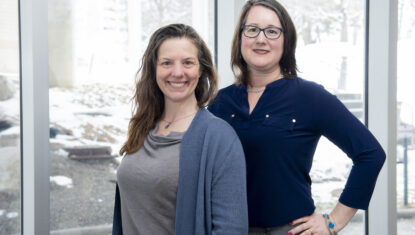07/02/2025
Ottawa, Ontario — Friday February 7, 2025

New findings affirm mothers who took selective serotonin reuptake inhibitors (SSRIs) during pregnancy may safely choose their preferred feeding method without impacting likelihood of their newborns experiencing withdrawal from the medication.
While a small percentage of newborns experience withdrawal from SSRIs following birth, symptoms like jitteriness, fussiness, crying, feeding problems and sleep issues may occur. These symptoms tend to improve within a few days without the need for medical intervention.
The study, led by Christina Cantin, Nursing Research Scientist at the CHEO Research Institute, compared withdrawal diagnoses for breastfed versus formula-fed newborns, examining whether the feeding method impacted withdrawal or transfer to a Neonatal Intensive Care Unit (NICU).
Findings showed that neither of the feeding methods increased the risk of withdrawal, making either one safe for new mothers to choose as long as the baby is adequately monitored. The study also showed a possible lower risk of transfer to the NICU in breastfed newborns.
“During pregnancy, it’s critical that we not only support a mother’s physical health, but mental health too. Maternal well-being is essential for their own health and the growth and development of healthy children,” said Cantin. “Pregnant women worry about the negative impacts of taking medication. These findings show us that mothers should be encouraged and reassured to continue taking their medication during pregnancy and choose the feeding method they prefer, knowing that with proper monitoring, their choice will not impact the likelihood that their newborn experiences SSRI withdrawal.”
Mood and anxiety disorders are the most common pregnancy complication, affecting roughly 1 in 5 women, with SSRIs being the most used antidepressant medication by pregnant women. Maternal mental health research is vital so both medical providers and parents can be better informed as they navigate pregnancy and parenthood alongside mental health concerns.
A thriving Nursing Research Community of Practice at CHEO
Cantin is part of CHEO’s Nursing Research Community of Practice at CHEO, which is evolving into CHEO’s first Nursing Research Centre, a collaborative effort between CHEO and the CHEO Research Institute. This Nursing Research Centre will be a hub for nurse-led research, where nurses can network and showcase innovative ideas for practice, as well as obtain support to build their research expertise.
It supports early-career and experienced nurses alike, providing mentorship and opportunities, all of which are designed to be relevant to, and grounded in, clinical nursing best practices and CHEO’s own service delivery.
By integrating research into their clinical, leadership, and education roles, CHEO nurses can contribute to disciplinary knowledge, translate this knowledge into care, and enjoy a rewarding career. As of now, there are over 250 members in the network, consisting of nurses, nurse practitioners (NPs), advanced practice nurses (APN), educators, researchers and leaders.

Dr. Rochelle Einboden, Scientist at the CHEO Research Institute, CHEO’s Research Chair in Nursing Care of Children, Youth and their Families, and Associate Professor in the School of Nursing at the University of Ottawa, developed the Nursing Research Community of Practice collaboratively with other nurses at CHEO. It was developed from a growing interest amongst nurses to connect and learn about each other’s research work and interests and increase visibility of and opportunities for nurse-led research at CHEO. As the community of practice continues to grow and gain momentum, CHEO’s Nursing Research Centre will champion the research expertise of CHEO nurses.
Together, Dr. Einboden, Cantin, and many other CHEO nurse researchers and leaders now offer formal mentorship to support CHEO nurses across the research continuum—from co-facilitating workshops on pediatric nursing research, securing funding for academics and research, supporting research development, to assisting with research dissemination activities to ensure knowledge is shared.
Unleashing nurse-led research at CHEO: What’s next
Tammy DeGiovanni, Senior Vice-President of Clinical Services and Chief Nursing Executive at CHEO, can attest to the insight, experience and value nurses bring to identifying compelling and meaningful research questions, leading impactful research and developing new disciplinary knowledge. She and Dr. Jason Berman, CEO and Scientific Director of the CHEO Research Institute and Vice-President of Research at CHEO, are committed to expanding nurse-led research at CHEO.
“CHEO fosters a culture of innovation, and empowers nurses to lead, collaborate, and contribute to groundbreaking research,” said DeGiovanni. “By supporting our nurses in developing a Nursing Research Centre we are not only enhancing clinical practices but ensuring our care delivery evolves as new, evidence-based insights and discoveries are made.”
There are several plans in motion for 2025, including the launch of a new Nursing Research Internship Program, expanding the Nursing Research Community of Practice with representatives from each clinical area, and hosting a nursing research conference, themed The Power of Nursing Curiosity, in October 2025.
The Nursing Research Internship Program will enroll up to five nurses per year and support them in transforming their ideas into clinically important research studies to enhance nurse-led research here at the CHEO Research Institute.
“Being able to offer this internship to nurses is so important because it gives them the knowledge, tools and network needed to transform current practice challenges into research questions for meaningful inquiry, and to start the process of addressing them,” said Dr. Einboden of the program that will teach interns how to apply their clinical expertise and thoughtful approach in practice to nurse-led research. “Nurses in direct care are the knowledge brokers for meaningful contemporary disciplinary research. They know what the burning practice issues are and bring vision and valuable expertise that needs to be represented in the knowledge that is used to shape programs and practice.”
To learn more about nursing research at CHEO and the CHEO Research Institute, please contact Christina Cantin at [email protected].

